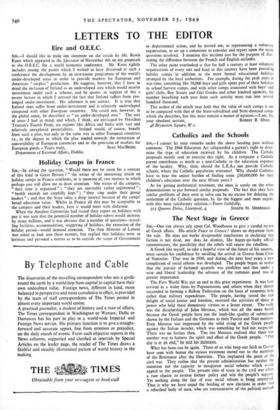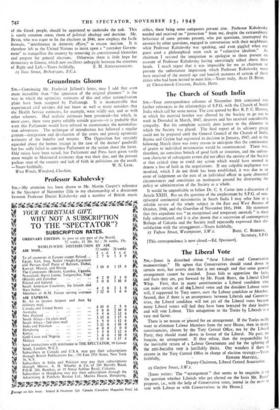The Next Stage in Greece
SIR,—One can always rely upon Col. Woodhouse to give a careful review of Greek affairs. His article Peace in Greece ? shows no departure from the rule. He does not burke disagreeable conclusions in declaring that faction is not dead, nor does he dismiss, like happy-go-lucky official commentators, the possibility that the rebels will renew the rebellion.
A Greek like myself, to take a hopeful view of the future of his country, must sustain his confidence by recalling the arrival in Greece from Crete of Venizelos. That was in 1910, and during the next four years a new complexion of social reform was developed. The people began to realise that the pursuit of factional quarrels was profitless and that under a wise and liberal leadership the advance of the common good was of greater importance.
The First World War put an end to this great experiment. It was later revived in a wider form by Papanastasiou and others when they almost succeeded in forming a Balkan Federation. on the basis of economic help rather than military expenditure. The people, having tasted the rare delight of social justice and freedom, resented the activities of those in power who held these democratic virtues to a lesser extent. The reply was the dictatorship of John Metaxas, which was all the more brutal because the Greek people have not the lamb-like quality of submission shown by the Italians and the Germans to their Fascist and Nazi mentors. Even Metaxas was impressed by the solid rising of the Greek people against the Italian invader, which was something he had not suspected. There was no faction then. Too late Metaxas realised that there svas another way to harness the spirit and effort of the Greek people. "Out day is at an end," he told his intimates.
What has been can be again. Those of us who keep our faith in Grace have seen with horror the vicious treatment meted out to the members of the Resistance after the liberation. This implanted the germ of the civil war. They realise that the present administration has neither the intention nor the capacity to inaugurate social reforms which would appeal to the people. The present time of truce in the civil war offers a rare chance to reverse former policy and win the people's support. Yet nothing along the line of true social reform is being attempted. That is why we have urged the holding of new elections in order that a refreshed body of men, who are representative of the political outlook of the Greek people, should be appointed to undertake the task. This is surely common sense, shorn of political ideology and doctrine. Mr. Bevin, who was eager to fix the elections in 1946, now employs the facile formula, "interference in domestic affairs," to excuse inaction. It is therefore left to the United Nations to insist upon a "caretaker Govern- ment" to tranquillise the country by removing its constitutional blemishes and prepare for general elections. Otherwise there is little hope for democracy in Greece, which now oscillates unhappily between the extremes







































 Previous page
Previous page